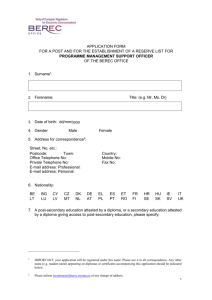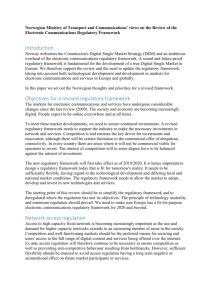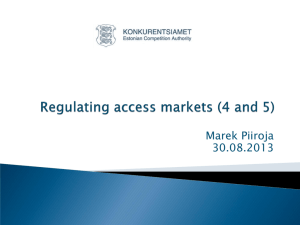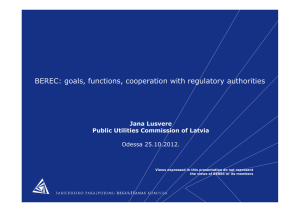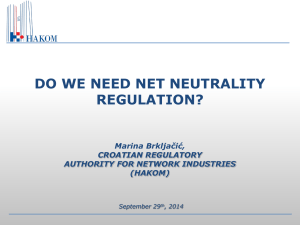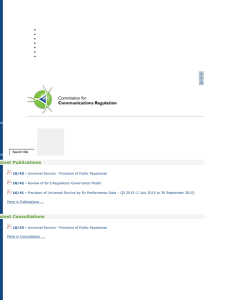Document 13252355
advertisement
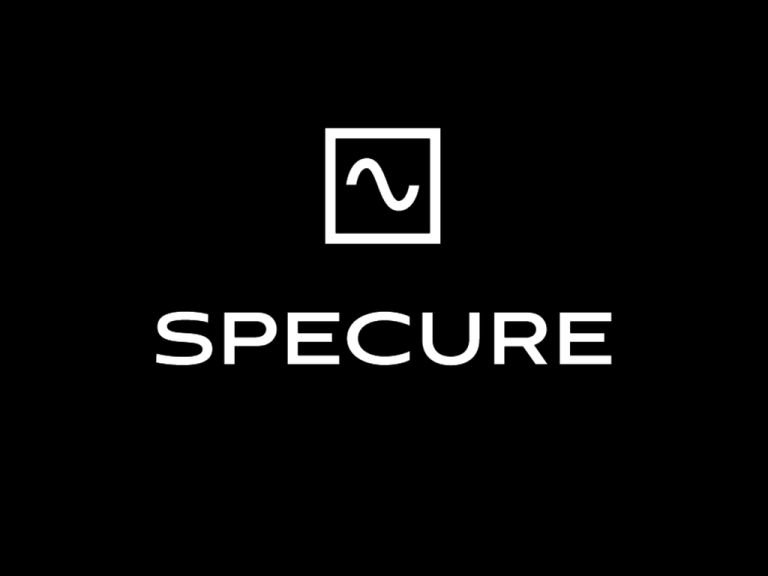
Nettest An implementation of BEREC’s recommendations Andreas Gaber May 10th, 2016 In order to provide robust quality measurement results, the crowd-sourced approach must aim to collect a large number of participants. BEREC 25.09.2014 2.64 Million complete measurements in all 28 EU countries In total out of 191 countries The success of the crowd-sourced approach relies on a low threshold for participation. BEREC 25.09.2014 Statistical analysis, historical measurements, heatmaps, social media integration, gaming ... In best case Open Data. Details about the measurement methodology should be made available, and open source code should be considered as an option. Furthermore, transparency of collected data (“open data”) should also be sought. BEREC 25.09.2014 Comparability of individual sample measurements, comparability at higher levels such as comparability between IASes, and between countries… …so that degradation of certain offers, or degradation caused by specialised services, can be identified… BEREC 25.09.2014 An important quality indicator for net neutrality is achieved by monitoring the effects of congestion in the network. BEREC 25.09.2014 Blocking of traffic Changing of content DNS spoofing Traffic management detection Thank you for your attention! SPECURE GMBH Kaiserstrasse 8, 1070 Wien, Austria +43 1 890 93 09 https://nettest.specure.com/ info@specure.com Legend: Operator provided Under negotiation Third party provided Specure provided Specure ongoing BEREC recommendations 1/3 According to report published on 25.09.2014, Body of European Regulators recommends following parameters of IAS quality monitoring system: Parameter Recommendation NetTest compliance IP layer measurements Measuring at least following IP layer parameters: upload and download speed, delay, jitter, and packet loss ratio. yes Including all types of IAS The recommended IP layer metrics are applicable for fixed as well as wireless/mobile Internet access services. yes Monitoring degradation of service When evaluating potential degradation of IAS as a whole, BEREC recommends that such measurements are conducted over time to allow trend analysis. yes Crowd-sourcing Regarding aggregated results, BEREC recommends - for reasons of cost-effectiveness and user-friendliness - that averaging (based on data gathered from all participating users) should be done based on crowd-sourcing. yes Software-based Implement end user transparency measurements in a useragent friendly manner (a software-based measurement agent downloaded to end user equipment). yes BEREC recommendations 2/3 Parameter Recommendation (as stated in BEREC report) Accuracy Accuracy requires that results are obtained from a clearly defined population and their statistical treatment is well documented, so that results can be interpreted without bias. yes This includes “plain” comparability of individual sample measurements, but also comparability at higher levels, such as comparability between IASes, and between countries when possible, so that degradation … can be identified with a sufficient level of confidence. yes The system components must be robust and protected against security attacks, and availability, integrity and confidentiality of the measurement data must be secured during storage and transmission. yes This implies that the user must be informed which data are collected, for what purpose and what information shall be included, how data will be used, and specifically that some information may be made available to the public. yes The system governance must be designed in a way which mitigates conflicts of interest and ensures credible results. yes Comparability Security Privacy Legal value NetTest compliance BEREC recommendations 3/3 Parameter Recommendation (as stated in BEREC report) End user enablement For regulators to set up a measurement system with the overall aim of being objective and provider-independent and enabling users to undertake measurements implies and maybe even intends that an end user will rely on and make further use of the measurement results. yes Future-proof The system design should ensure flexibility, extensibility, scalability and adaptability. yes Open source code Details about the measurement methodology should be made available, and open source code should be considered as an option to achieve this requirement. Knowledge of source code is therefore the ultimate tool to make the measurement methodology transparent. yes Furthermore, transparency of collected data (“open data”) should also be sought, with due respect for the limitations of national legislation. yes Open data principle NetTest compliance
